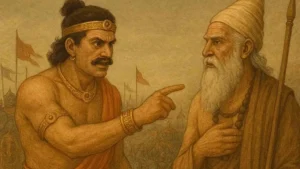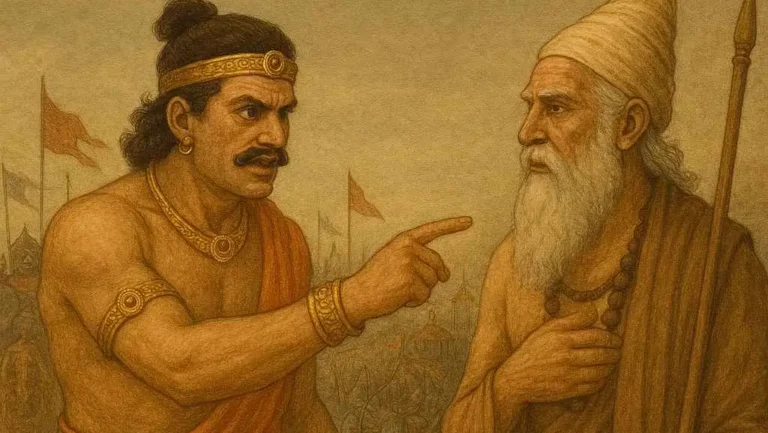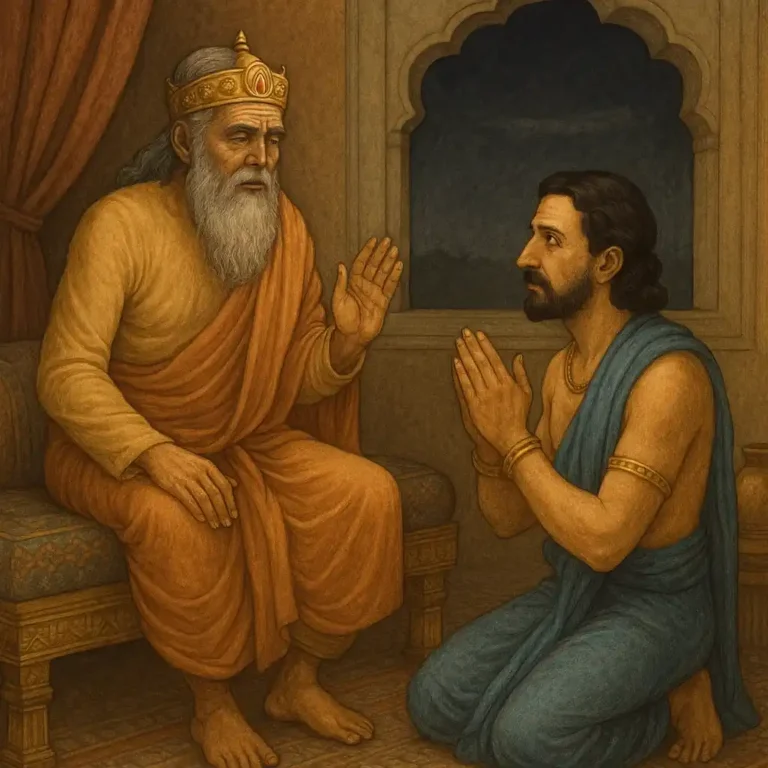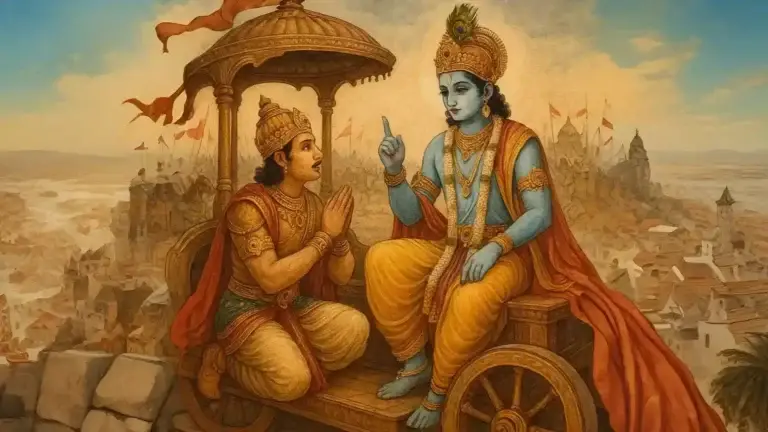Why Does the Bhagavad Gita Include Verses Where Duryodhana Merely Lists Names?

Bhagavad Gita: Chapter 1, Verses 4-6
अत्र शूरा महेष्वासा भीमार्जुनसमा युधि
युयुधानो विराटश्च द्रुपदश्च महारथ: || 4||
धृष्टकेतुश्चेकितान: काशिराजश्च वीर्यवान्
पुरुजित्कुन्तिभोजश्च शैब्यश्च नरपुंगव: || 5||
युधामन्युश्च विक्रान्त उत्तमौजाश्च वीर्यवान्
सौभद्रो द्रौपदेयाश्च सर्व एव महारथा: || 6||
Transliteration:
atra śhūrā maheṣhvāsā bhīmārjuna-samā yudhi
yuyudhāno virāṭaśhcha drupadaśhcha mahā-rathaḥ
dhṛiṣhṭaketuśhchekitānaḥ kāśhirājaśhcha vīryavān
purujit kuntibhojaśhcha śhaibyaśhcha nara-puṅgavaḥ
yudhāmanyuśhcha vikrānta uttamaujāśhcha vīryavān
saubhadro draupadeyāśhcha sarva eva mahā-rathāḥ
Translation:
BG 1.4-1.6: “O teacher, behold the mighty warriors among the sons of Pandu, arrayed for battle by your own talented disciple, the son of Drupada. Here in this formidable army are great archers equal in prowess to Bhima and Arjuna—Yuyudhana, Virata, and Drupada, the great chariot-warrior. There are also Dhrishtaketu, Chekitana, the gallant king of Kashi, Purujit, Kuntibhoja, and Shaibya—the best among men. Mighty Yudhamanyu, the valiant Uttamauja, the son of Subhadra (Abhimanyu), and the sons of Draupadi—all of them are great chariot-warriors.”
Duryodhana’s Fear: A Deeper Look
In previous discussions, we explored Duryodhana’s fear and how, despite having a much larger army (1.5 times that of the Pandavas), he still perceived his enemies as more powerful. The Bhagavad Gita doesn’t just present us with a surface-level narrative—it invites us into the mind of a fearful man. In these verses, Duryodhana begins listing the names of the warriors on the opposing side, mentioning twenty names. This simple act reveals an important truth about human psychology.
When we are consumed by fear or jealousy, we focus excessively on external factors rather than our own capabilities such as knowledge and experience. Instead of recognizing his own army’s strength, Duryodhana fixates on the strengths of his enemies. This is a lesson for all of us: If we spent as much time reflecting on our own abilities as we do envying others, we would be in a far better position to succeed.
Why Does Duryodhana List These Names?
At first glance, it might seem unnecessary to include a long list of names in the Bhagavad Gita. But every verse in the Gita serves a purpose. By analyzing Duryodhana’s behavior, we can understand some crucial aspects of fear and insecurity:
- Fear Amplifies the Enemy’s Strength
- Duryodhana had great warriors on his side, yet he starts by counting his enemies. This shows that when we are fearful, we tend to exaggerate the power of our obstacles instead of focusing on our own strengths.
- Jealousy Fixates on Others Instead of Self-Improvement
- Instead of strategizing based on his own resources, Duryodhana is obsessed with his competitors. Similarly, in life, we often waste energy comparing ourselves to others instead of focusing on personal growth.
- Anxious Minds Seek Reassurance
- Duryodhana lists out warriors on both sides, but his list of allies is much shorter than his list of enemies. This shows that fear skews our perception—making problems seem bigger than they are while downplaying our own capabilities.
Duryodhana’s Attempt at Self-Reassurance (BG 1.7-1.9)
अस्माकं तु विशिष्टा ये तान्निबोध द्विजोत्तम |
नायका मम सैन्यस्य संज्ञार्थं तान्ब्रवीमि ते || 7||
भवान्भीष्मश्च कर्णश्च कृपश्च समितिञ्जय: |
अश्वत्थामा विकर्णश्च सौमदत्तिस्तथैव च || 8||
अन्ये च बहव: शूरा मदर्थे त्यक्तजीविता: |
नानाशस्त्रप्रहरणा: सर्वे युद्धविशारदा: || 9||
Transliteration:
asmākaṁ tu viśhiṣhṭā ye tānnibodha dwijottama
nāyakā mama sainyasya sanjñārthaṁ tānbravīmi te
bhavānbhīṣhmaśhcha karṇaśhcha kṛipaśhcha samitiñjayaḥ
aśhvatthāmā vikarṇaśhcha saumadattis tathaiva cha
anye cha bahavaḥ śhūrā madarthe tyaktajīvitāḥ
nānā-śhastra-praharaṇāḥ sarve yuddha-viśhāradāḥ
BG 1.7-1.9: O best of Brahmins, hear too about the principal generals on our side, who are especially qualified to lead. These I now recount unto you. There are personalities like yourself, Bheeshma, Karna, Kripa, Ashwatthama, Vikarn, and Bhurishrava, who are ever victorious in battle. Also, there are many other heroic warriors, who are prepared to lay down their lives for my sake. They are all skilled in the art of warfare, and equipped with various kinds of weapons.
Key Takeaways: Overcoming Fear and Jealousy
- Fear is Often an Illusion
- Duryodhana had a larger army, yet his fear made him feel weak. In life, we often overestimate the power of obstacles and underestimate our own strength.
- Jealousy Distracts Us from Growth
- Instead of improving ourselves, we become obsessed with what others have. Duryodhana’s fixation on his enemies is a classic example of this.
- Shift Your Perspective
- A wise man sees opportunity where a fearful man sees risk. To an enlightened soul, there are no risks—only paths to success.
What are your thoughts on this interpretation? Have you ever found yourself in a situation where fear distorted your perception of reality? Share your insights in the comments below!



